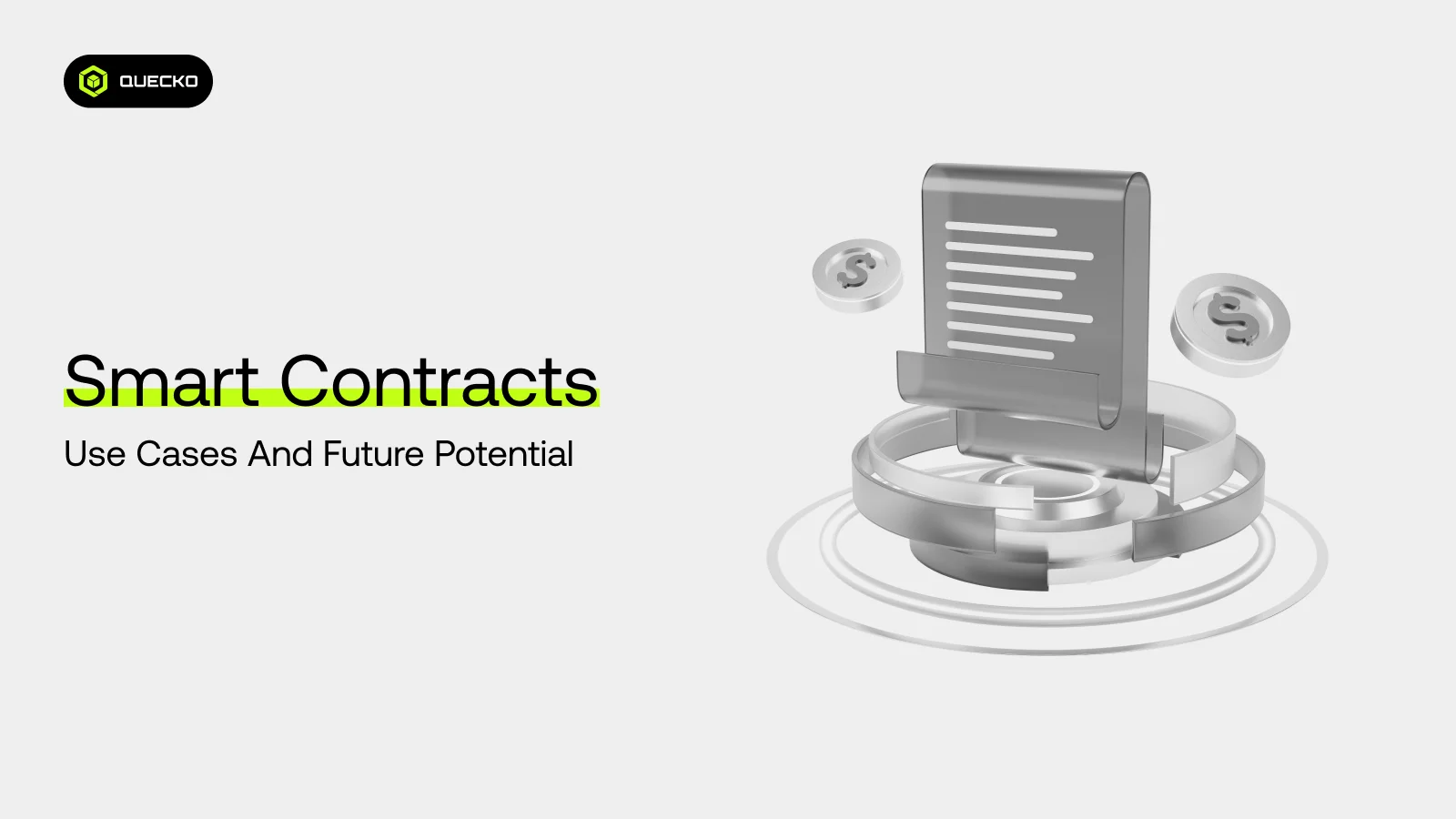Smart Contracts: Use Cases and Future Potential
Smart contracts automate transactions across industries with speed, transparency, and security.

Smart contracts are self-executing agreements with the terms directly written into code and deployed on blockchain networks. By eliminating intermediaries, they bring unprecedented transparency, security, and automation to transactions. Since their debut with Ethereum in 2015, smart contracts have disrupted industries, from financial services and real estate to supply chains and digital assets management.
Today, they power everything from instant real asset transactions to decentralized finance (DeFi), proving that trustless, automated systems are the future of business and technology.
In this blog, we’ll explore how smart contracts work, their real-world applications, and their potential to reshape entire industries.
How Do Smart Contracts Work?
Smart contracts are digital protocols that automatically execute predefined actions when certain conditions are met. These smart contracts function on blockchain technology and are transforming industries such as supply chains, financial services, and real estate blockchain networks.
Key characteristics of smart contracts include:
- Decentralization – No single entity controls the contract.
- Immutability – Once deployed, the contract cannot be altered.
- Transparency – All parties can verify contract terms and execution.
- Automation – Eliminates manual processing and reduces human error.
In real estate transaction smart contracts use cases, these self-executing agreements streamline property transfers, reduce paperwork, and enhance verification processes. Similarly, smart contracts enhance decentralized applications, where trust is algorithmic and not reliant on third-party intermediaries.
Moreover, digital identity verification becomes more robust and secure through smart contracts, enabling privacy-preserving identity systems. When integrated with artificial intelligence, smart contracts become more adaptive and intelligent—reacting to complex datasets while upholding rules with precision.
In essence, smart contracts are reshaping how agreements are executed in the digital age, with efficiency, security, and scalability.
Key Components of a Smart Contract:
A smart contract is a self-executing digital agreement in which the terms of the contract are written directly into lines of smart contract code. These digital protocols revolutionize traditional contracting by automating execution and verification through distributed ledger technologies.
Core Components of Smart Contracts:
- Agreement Terms: This is the heart of smart contract development. It involves programming logic using languages like Solidity to define conditions, obligations, and outcomes of the agreement. These digital contracts reflect legal or business intent in coded form.
- Blockchain Execution: Contracts run on a decentralized network such as Ethereum or Solana. The Ethereum Virtual Machine (EVM) provides a runtime environment where smart contracts are deployed and executed across multiple nodes, ensuring transparency and tamper-resistance.
- Triggering Events: Contracts are activated by on-chain events or real-world data fed through external services called oracles. For instance, in a smart contract use case related to clinical traits and healthcare, patient data from IoT devices might initiate execution, an example where the Internet of Things meets blockchain automation.
Smart contracts enhance trust and efficiency across industries, from financial services to healthcare. Their development represents a fusion of traditional legal logic with cutting-edge blockchain innovation.
Use Cases of Smart Contracts
Smart contracts are digital protocols written as smart contracts code that automatically execute specific actions when predefined conditions are met. Operating on a distributed ledger, they eliminate intermediaries and reduce human error through automated execution. These digital agreements have become central to modern blockchain ecosystems, reshaping sectors ranging from real estate transactions to healthcare, gaming, and finance.
Below are key smart contract use cases that highlight their versatility and impact:
1. Decentralized Finance (DeFi)
In the DeFi space, smart contracts are foundational to trustless and permissionless financial operations. They enable:
- Automated lending & borrowing: Protocols like Aave and Compound utilize smart contracts to match borrowers and lenders, calculate interest rates, and handle liquidations.
- Decentralized exchanges (DEXs): Platforms such as Uniswap and SushiSwap use automated execution to facilitate token swaps without centralized market makers.
- Stablecoins & yield farming: Collateralized assets and farming strategies are enforced by smart contracts code, ensuring consistency and transparency.
Through these innovations, smart contracts have reduced overhead, enabled financial inclusion, and created new yield opportunities.
2. Supply Chain Management
Supply chain management benefits immensely from smart contract use cases that improve visibility and trust across logistics networks:
- Real-time tracking & verification: Projects like IBM Food Trust deploy blockchain-powered systems with smart contracts to trace product origin and movement.
- Automated payments: Upon confirmation of delivery, payments can be triggered via automated execution, accelerating supplier compensation.
- Fraud reduction: Immutable records ensure authenticity, and smart contracts prevent data manipulation by embedding verification steps directly into the transaction flow.
Whether in pharmaceuticals, agriculture, or electronics, the impact of smart contracts on supply chain management is making logistics smarter and more accountable.
3. Real Estate
Smart contracts are modernizing the real estate sector by streamlining processes and democratizing ownership:
- Tokenized property ownership: Blockchain platforms can fractionalize assets, allowing multiple investors to co-own real estate via non fungible tokens or asset-backed tokens.
- Automated escrow & payments: Smart contracts can hold funds until conditions are met, simplifying complex financial settlements during property transactions.
- Reduced paperwork: Digital title transfers and e-signatures embedded in the contract logic reduce bureaucratic delays.
- Faster transactions: A real estate transaction that typically takes weeks or months can be completed in minutes with blockchain-enabled automated execution.
From rental contracts to land registry, smart contracts minimize risk and enhance accuracy in real estate transactions.
4. Insurance
In insurance, smart contracts increase efficiency and reduce claim fraud:
- Automated claims processing: Travel insurers like Etherisc use flight delay data from oracles to trigger smart contracts for immediate payouts.
- Fraud prevention: Transparent verification using on-chain identities limits false claims.
- Parametric insurance: Instead of manual assessments, payouts are based on predefined metrics (like rainfall or earthquake magnitude), which activate the contract automatically.
These digital agreements not only speed up disbursement but also enhance client trust and operational integrity.
5. Healthcare
Healthcare systems apply smart contracts to elevate patient security and operational resilience:
- Secure patient data sharing: With smart contracts, patients can grant permissioned access to doctors or researchers while maintaining control of their information.
- Automated insurance claims: Billing and approvals are coded into smart contracts code, reducing administrative delays and errors.
- Drug traceability: Blockchain solutions using smart contract use cases allow real-time tracking of medicines to combat counterfeiting, verifying clinical traits and manufacturing origin.
By merging blockchain with clinical traits, healthcare institutions can optimize diagnostics, billing, and pharmaceutical integrity.
6. Voting & Governance
Smart contracts enable tamper-proof democratic mechanisms through decentralized platforms:
- Blockchain voting systems: Voter identity and choices can be verified and recorded immutably, reducing election fraud.
- Decentralized Autonomous Organizations (DAOs): DAOs use smart contracts for community-driven governance, where members vote on proposals and allocate funds transparently.
By removing centralized control, digital agreements in governance empower direct participation and reduce manipulation.
7. Gaming & NFTs
Digital gaming and collectibles thrive through the application of smart contracts and non fungible tokens:
- Provably rare assets: NFTs ensure scarcity and ownership of in-game items, verifiable on the blockchain via smart contract code.
- Play-to-earn (P2E) economies: Games like Axie Infinity reward players through smart contracts that distribute tokens based on performance.
- Royalty automation: Creators earn recurring revenue when their assets are resold, as defined in the NFT’s embedded smart contract.
Gaming now has transparent ownership, play-based income, and creative incentives built directly into digital agreements.
8. Legal & Compliance
Smart contracts offer a powerful upgrade to traditional legal frameworks:
- Self-executing agreements: Rental leases, employment contracts, and service deals can be encoded into smart contracts, removing ambiguity and manual enforcement.
- KYC/AML automation: Regulatory compliance checks are incorporated directly into smart logic, preventing unauthorized access and financial crime.
- Property transaction audits: For real estate, blockchain ensures transparent documentation, enabling consistent checks on title and ownership, crucial during real estate transactions.
These applications increase compliance while reducing time-consuming legal processes.
Challenges & Limitations
Despite their transformative potential, smart contracts are not without challenges. As industries adopt these digital agreements, it’s crucial to address the limitations that could hinder widespread adoption and trust.
1. Code Vulnerabilities
Smart contracts code must be airtight. Even small bugs or exploits can have massive consequences, as seen in the infamous DAO hack on Ethereum, where a vulnerability led to the loss of millions in ETH.
- Risk: Security flaws can be exploited by malicious actors due to immutable contract deployment.
- Solution: Rigorous smart contract development practices including thorough code reviews and audits by tools like CertiK and OpenZeppelin. These platforms offer static analysis, formal verification, and real-time monitoring to prevent exploits before contracts go live.
2. Legal Recognition
While smart contracts offer an alternative to traditional legal frameworks, they currently lack widespread recognition under many national laws.
- Risk: If disputes arise, it’s unclear how courts interpret or enforce these digital contracts.
- Solution: The emergence of hybrid smart contracts, which combine coded logic with legal language, offers a bridge between blockchain and traditional systems. These contracts can include clauses enforceable both on-chain and off-chain, paving the way for legal clarity and adoption.
3. Scalability Issues
Ethereum, the dominant platform for smart contract development, faces congestion and high gas fees, especially during peak activity, making it expensive and slow for users.
- Risk: High transaction costs discourage participation, and slow speeds can hinder applications like real estate transactions or large-scale supply chain management.
- Solution: Scaling technologies such as Layer 2 networks (e.g., Polygon, Arbitrum) and alternative blockchains like Solana offer faster throughput and lower costs. These platforms enhance performance without sacrificing the security and decentralization of the main chain.
4. Oracle Reliability
Smart contracts often depend on external data, like asset prices or weather reports, to execute. But relying on centralized or poorly verified sources introduces risk.
- Risk: Manipulated or faulty data inputs can cause incorrect or fraudulent contract execution.
- Solution: Decentralized oracles like Chainlink aggregate data from multiple sources and use reputation systems to enhance trust. These oracles ensure reliable and tamper-resistant feeds, protecting contracts that depend on external triggers, such as clinical traits, flight delays, or property transaction verification.
By addressing these hurdles with strategic tools and infrastructure, the promise of smart contracts, from healthcare automation to real estate transaction efficiency, continues to evolve. The shift toward secure, scalable, and legally recognized digital agreements is paving the way for their integration across both emerging and established sectors.
Future Potential of Smart Contracts
As blockchain technology matures, the evolution of smart contracts promises to redefine how industries operate. Below are five forward-looking trends shaping their future:
- Mass Adoption in Enterprises Large corporations are expected to implement smart contracts extensively for B2B transactions, automating supply chains and vendor agreements. This will significantly reduce delays, human error, and fraud, while enhancing operational efficiency and trust between business partners.
- AI & Smart Contract Synergy Artificial intelligence will work in tandem with smart contract code to auto-optimize agreement terms, predict potential disputes, and detect vulnerabilities before deployment. This fusion will enable smarter, safer digital agreements tailored to dynamic data environments.
- Cross-Chain Interoperability Platforms like Polkadot and Cosmos are pioneering mechanisms to allow smart contracts to communicate across different blockchain ecosystems. This cross-chain interaction will unlock broader use cases and remove barriers between isolated networks.
- Regulatory Advancements Governments and regulatory bodies are expected to craft more comprehensive legal frameworks for smart contracts, improving clarity and enforceability. These developments will pave the way for institutional use in sectors like real estate transactions, finance, and healthcare.
- IoT Integration As the Internet of Things expands, smart contracts will automate device-to-device interactions. For example, self-paying electric vehicles could trigger payments at charging stations autonomously via blockchain—reducing friction and enabling seamless transactions across networks.
Conclusion
Smart contracts are reshaping industries by enabling trustless, automated, and transparent transactions. While challenges like scalability and regulation remain, advancements in blockchain tech and AI will drive their future growth.
As adoption increases, smart contracts could become the backbone of a decentralized digital economy, reducing inefficiencies and empowering users worldwide.
Date
3 months agoShare on
Related Blogs

How Blockchain Is Rewiring Corporate Banking
2 days ago

AI And Blockchain Synergy: Building Smarter & Transparent Systems
4 days ago

The Quantum Leap: How Blockchain Must Evolve to Stay Secure
7 days ago

The Future of Web3 UX Is Here: AI Meets Cross-Chain Wallets
15 days ago








